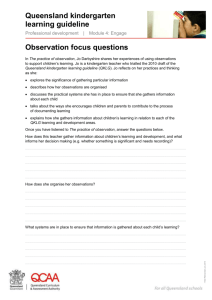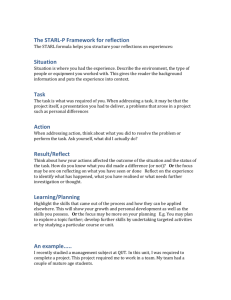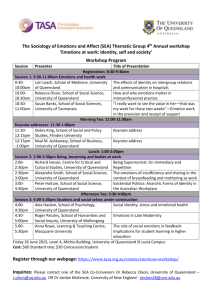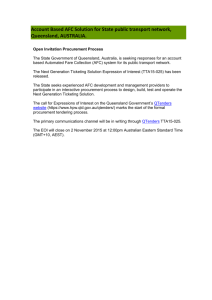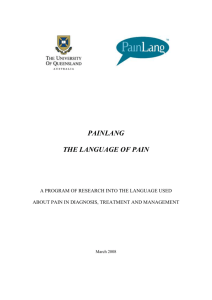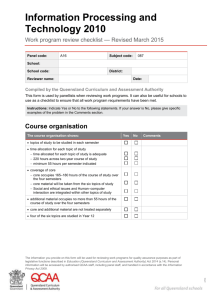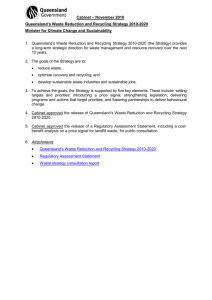Open Government Policy Forum Creating a government that is
advertisement
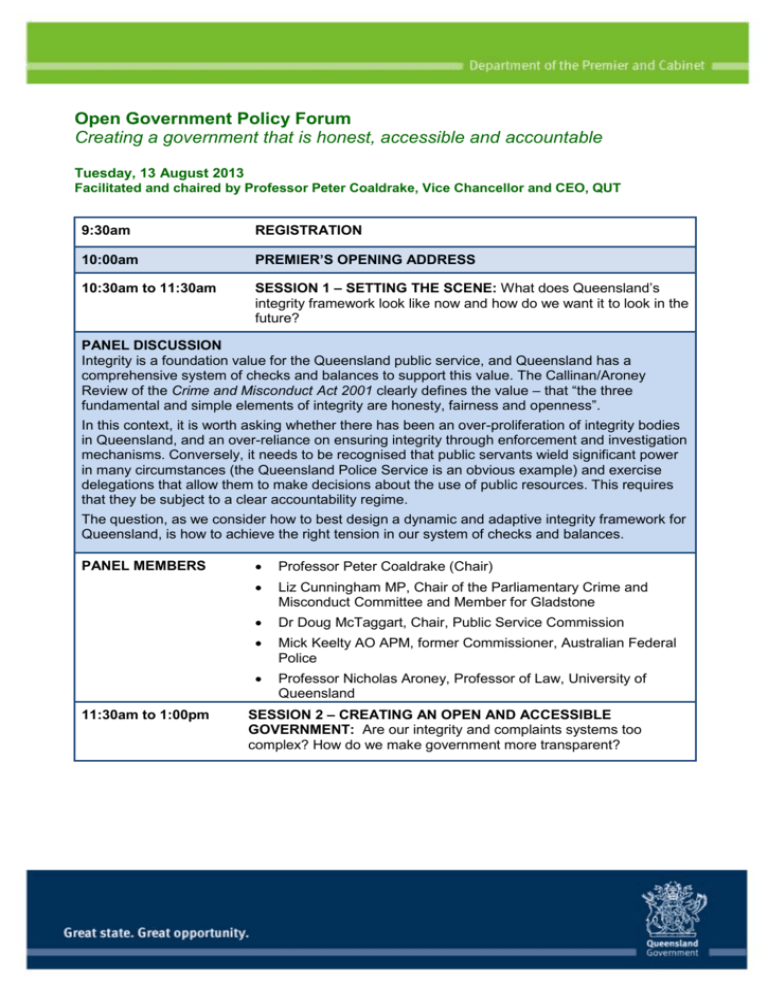
Open Government Policy Forum Creating a government that is honest, accessible and accountable Tuesday, 13 August 2013 Facilitated and chaired by Professor Peter Coaldrake, Vice Chancellor and CEO, QUT 9:30am REGISTRATION 10:00am PREMIER’S OPENING ADDRESS 10:30am to 11:30am SESSION 1 – SETTING THE SCENE: What does Queensland’s integrity framework look like now and how do we want it to look in the future? PANEL DISCUSSION Integrity is a foundation value for the Queensland public service, and Queensland has a comprehensive system of checks and balances to support this value. The Callinan/Aroney Review of the Crime and Misconduct Act 2001 clearly defines the value – that “the three fundamental and simple elements of integrity are honesty, fairness and openness”. In this context, it is worth asking whether there has been an over-proliferation of integrity bodies in Queensland, and an over-reliance on ensuring integrity through enforcement and investigation mechanisms. Conversely, it needs to be recognised that public servants wield significant power in many circumstances (the Queensland Police Service is an obvious example) and exercise delegations that allow them to make decisions about the use of public resources. This requires that they be subject to a clear accountability regime. The question, as we consider how to best design a dynamic and adaptive integrity framework for Queensland, is how to achieve the right tension in our system of checks and balances. PANEL MEMBERS 11:30am to 1:00pm Professor Peter Coaldrake (Chair) Liz Cunningham MP, Chair of the Parliamentary Crime and Misconduct Committee and Member for Gladstone Dr Doug McTaggart, Chair, Public Service Commission Mick Keelty AO APM, former Commissioner, Australian Federal Police Professor Nicholas Aroney, Professor of Law, University of Queensland SESSION 2 – CREATING AN OPEN AND ACCESSIBLE GOVERNMENT: Are our integrity and complaints systems too complex? How do we make government more transparent? PANEL DISCUSSION Consumers of government services are able to hold public servants to account for the standard of their service delivery through a variety of complaints mechanisms. An independent and effective complaints system is fundamental to ensuring public trust and confidence in the public sector. It should be understandable, open and accessible, and contribute to a public sector culture of good governance, with a focus on ensuring the best possible delivery of services to the public. It is worth asking whether Queensland’s integrity and complaints systems meet these basic requirements, or whether the multiplicity of integrity and complaints bodies can create confusion and lack of understanding by members of the public about where to take complaints. Transparency of operations of government is also fundamentally important in promoting accountability by keeping members of the public informed about the workings of government. A healthy system of government is an open government. The Right to Information Act 2009 and the Queensland Government’s Open Data initiative are examples of increased transparency in government. However, it is incumbent on government to maintain the impetus to find more ways to disclose information rapidly and readily, so that the public is placed in the best possible position to exercise their rights and entitlements. PANEL MEMBERS Professor Peter Coaldrake (Chair) Jonathan Horton, Barrister Elizabeth Jameson, Principal, Board Matters Professor Bill Lane, Clayton Utz Professor of Public Law, QUT Peter Timmins, lawyer and blogger, Open and Shut 1:00pm to 2:00pm LUNCH 2:00pm to 3:30pm SESSION 3 – CREATING AN HONEST AND ACCOUNTABLE GOVERNMENT: What needs to change about government’s authorising framework, as we move towards increasingly blurred lines between public service and private interest? PANEL DISCUSSION The Queensland Government is committed to creating a renewed, innovative and more efficient public service. This commitment envisages the Queensland public service playing a growing role as an innovation agent and facilitator of partnerships between the public, private and nongovernment sectors. This has direct implications for current governance and authorising arrangements in the public sector. Currently, these arrangements are mainly built around the ability to sanction, control and specify activities and outputs. This structure is being challenged by innovation and co-production by: forcing the public sector to be able to handle a higher degree of uncertainty and unpredictability, which is a part of driving innovation processes; and setting a new paradigm for how the public sector interacts and manages its relationships with the private and non-government sectors. PANEL MEMBERS 3:30pm to 4:00pm Professor Peter Coaldrake (Chair) Kathy Mac Dermott, Executive Director, Property Council of Australia (Queensland Division) Barton Green, President, Government Relations Professionals Association Sandy Blackburn-Wright, Head of Social Innovation, Westpac David Muir, former member, Accountability Round Table (Queensland chapter) CLOSING SESSION: Moving forward – Summary of key themes by Chair


